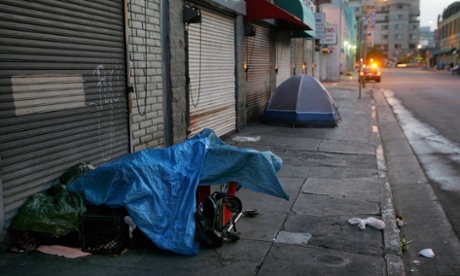Depriving the homeless of their last shelter is Silicon Valley at its worst – especially when rich cities aren't doing anything to end homelessness

Across
the United States, many local governments are responding to
skyrocketing levels of inequality and the now decades-long crisis of
homelessness among the very poor ... by passing laws making it a crime
to sleep in a parked car.
This happened most recently in Palo Alto, in California's Silicon Valley, where new billionaires are seemingly minted every month – and where 92% of homeless people lack shelter of any kind. Dozens of cities have passed similar anti-homeless laws. The largest of them is Los Angeles, the longtime unofficial "homeless capital of America", where lawyers are currently defending a similar vehicle-sleeping law before a skeptical federal appellate court. Laws against sleeping on sidewalks or in cars are called "quality of life" laws. But they certainly don't protect the quality of life of the poor.
To be sure, people living in cars cannot be the best neighbors. Some people are able to acquire old and ugly – but still functioning – recreational vehicles with bathrooms; others do the best they can. These same cities have resisted efforts to provide more public toilet facilities, often on the grounds that this will make their city a "magnet" for homeless people from other cities. As a result, anti-homeless ordinances often spread to adjacent cities, leaving entire regions without public facilities of any kind.
Their hope, of course, is that homeless people will go elsewhere, despite the fact that the great majority of homeless people are trying to survive in the same communities in which they were last housed – and where they still maintain connections. Americans sleeping in their own cars literally have nowhere to go.
Indeed, nearly all homelessness in the US begins with a loss of income and an eviction for nonpayment of rent – a rent set entirely by market forces. The waiting lists are years long for the tiny fraction of housing with government subsidies. And rents have risen dramatically in the past two years, in part because long-time tenants must now compete with the millions of former homeowners who lost their homes in the Great Recession.
The paths from eviction to homelessness follow familiar patterns. For the completely destitute without family or friends able to help, that path leads more or less directly to the streets. For those slightly better off, unemployment and the exhaustion of meager savings – along with the good graces of family and friends – eventually leaves people with only two alternatives: a shelter cot or their old automobile.
Read More Here
This happened most recently in Palo Alto, in California's Silicon Valley, where new billionaires are seemingly minted every month – and where 92% of homeless people lack shelter of any kind. Dozens of cities have passed similar anti-homeless laws. The largest of them is Los Angeles, the longtime unofficial "homeless capital of America", where lawyers are currently defending a similar vehicle-sleeping law before a skeptical federal appellate court. Laws against sleeping on sidewalks or in cars are called "quality of life" laws. But they certainly don't protect the quality of life of the poor.
To be sure, people living in cars cannot be the best neighbors. Some people are able to acquire old and ugly – but still functioning – recreational vehicles with bathrooms; others do the best they can. These same cities have resisted efforts to provide more public toilet facilities, often on the grounds that this will make their city a "magnet" for homeless people from other cities. As a result, anti-homeless ordinances often spread to adjacent cities, leaving entire regions without public facilities of any kind.
Their hope, of course, is that homeless people will go elsewhere, despite the fact that the great majority of homeless people are trying to survive in the same communities in which they were last housed – and where they still maintain connections. Americans sleeping in their own cars literally have nowhere to go.
Indeed, nearly all homelessness in the US begins with a loss of income and an eviction for nonpayment of rent – a rent set entirely by market forces. The waiting lists are years long for the tiny fraction of housing with government subsidies. And rents have risen dramatically in the past two years, in part because long-time tenants must now compete with the millions of former homeowners who lost their homes in the Great Recession.
The paths from eviction to homelessness follow familiar patterns. For the completely destitute without family or friends able to help, that path leads more or less directly to the streets. For those slightly better off, unemployment and the exhaustion of meager savings – along with the good graces of family and friends – eventually leaves people with only two alternatives: a shelter cot or their old automobile.
Read More Here


































Image source
****************************************************************************
The Huffington Post | By Jillian Berman
Posted: 06/21/2013 10:32 am EDT | Updated: 06/21/2013 7:33 pm EDT